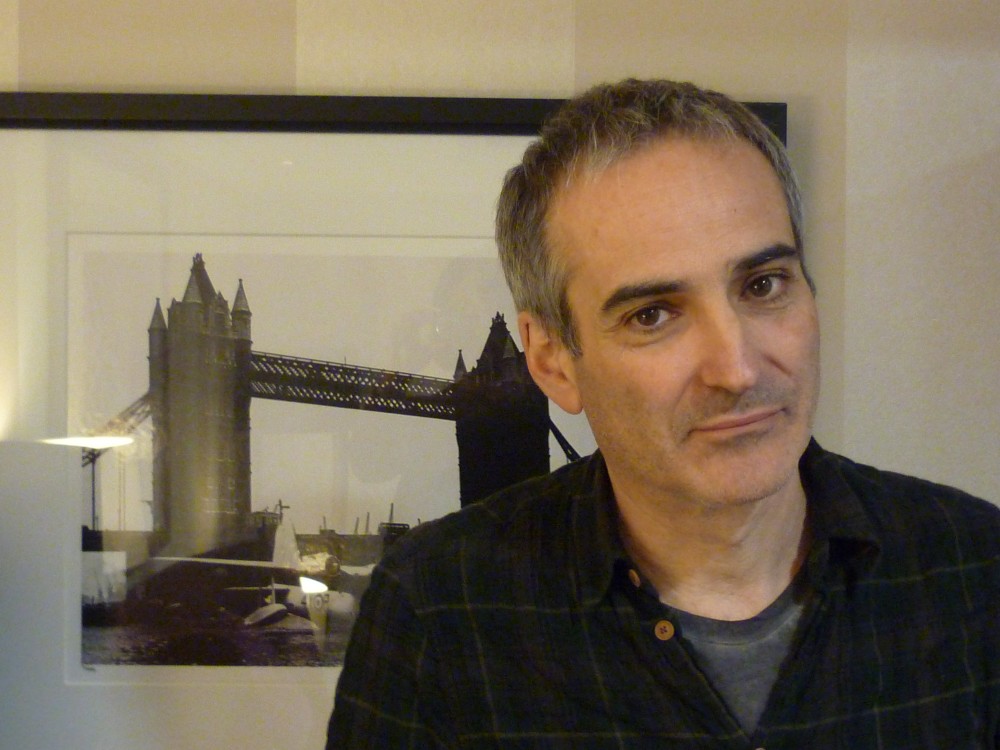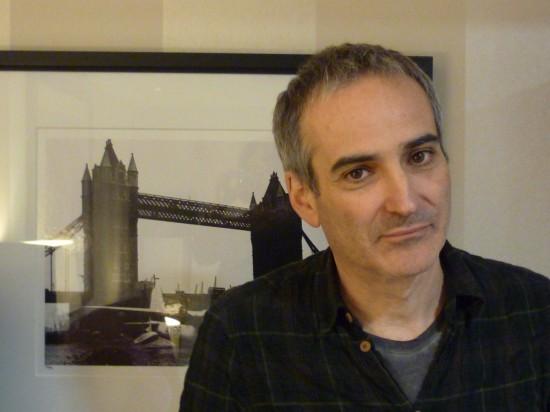
 Olivier Assayas. French Director, Screenwriter and film critic.
Olivier Assayas. French Director, Screenwriter and film critic.
Born 1955. Son of celebrated French filmmaker, Jacques Remy.
AT: Your father, he worked in television and film…
OA: He worked a long time in television, but alot of films. He assisted Pabst and Max Ophuls and moved to the US during the War directing. Then had a very solid career as a screenwriter for the French and Italian industries in the Fifties and then, in the Sixties, he mostly did TV work.
AT: The Neo-Realists: was he at all influenced by that movement?
OA: I don’t know… these were things I could and should have discussed with him, but he died when I was fairly young: I was in my early twenties and he was… he grew up in Italy, in Milan and he was a militant anti-Fascist and was close to alot of people involved in Neo-Realism. He was perfectly bilingual and was writing in Italian and in French and he was writing alot of screenplays, working mostly with alot of writers, like (Cesare) Zavattini (Bicycle Thieves) and people like that who were involved in the history of Italian Neo-Realism, but he himself, to my knowledge, he didn’t write any kind of movie that had any kind of solid connection to the Neo-Realist movement. (But) he wrote for people like Alessandro Blasetti (1860) and Riccardo Freda (Giants Of Thessaly)… those people.
AT So, you obviously grew up steeped in film, in one way or another… and indeed, you worked with him when you first started out…
OA Yes, yes, I suppose it was the proximity of cinema, the fact that it was not something that was not part of a different world… it was not alien, that made me imagine that I could one day become a filmmaker.
AT You took a long time…
OA I took a path certainly very different from whatever my father would have imagined, in the sense that… my father did not encourage me to be a filmmaker at all… to make movies, quite the opposite in fact
AT Get a ‘proper’ job…
OA Yeah, and he said “if you want to work in movies then work your way up, you know, do a serious job in the industry and work your way up…” and I did not want… It was the Seventies and I did not want to do some boring factory job.
AT In terms of influences, you talk of Bresson more than Truffaut, is that correct?
OA …Both. Both. How shall I put it..? I worship Truffaut. I think Truffaut is really like an extraordinary filmmaker and an extraordinarily important filmmaker. To me, he is the true heir to Jean Renoir. He is a fascinating and a complex artist and I have always loved his movies; I have loved them as a child, as a teenager and as a grownup, I still love every single movie he has ever made. So, he’s for me, a very important figure and I suppose the ‘Model’ as a filmmaker- with the difference that he was never interested in making movies outside of France; he’s the epitome of a French director, whereas I have always been attracted by the notion of making cosmopolitan/international, or, should I say, trans-national filmmaking. But it was another era, another time.
But then… I suppose that Bresson was essential to my desire to become a filmmaker, in the sense that it is the overwhelming beauty of his films that gave me a sense that movies were as important as any other art form. You see, the paradox is that I grew up with a family that is connected to cinema (although) my mother was a fashion designer, but my parents did not consider cinema as an art, at all. To them, art was painting, it was literature… and I wanted to be an artist and I suppose that it was (only) by watching the films of Bresson that gave me a sense that movies were as deep, as important, as profound as the greatest literature, as the greatest paintings. I realised then that there is no debate, it’s like, way, way up there and if movies have taken Bresson that far, then it’s worth trying. It’s worth devoting your life to trying…
AT How old were you when you came to that kind of conclusion?
OA I would say my early twenties.
AT And, when you are making a film, would you say you have a consciousness about how Bresson for instance, directed?
OA Do you know, the lessons of the great artists, is ‘Do Things Your Way’. Bresson made movies in a way completely different from anything anybody had done before and that is why he is Bresson and that is why he is a genius. The basic message is do things your own way. Invent your own method, invent your own style, your own path and try to go as far as you can on your own path.
Bresson is a very powerful influence, because he found one of the keys to beauty in film. So when I started making films, the presence of Bresson was there… this kind of intimidating presence of Bresson was always there… you can see it in my early films (but) at some point, you have to break from that and you start your own journey.
AT And (Filmmaker, French Marxist theorist and founder Letterist) Guy Debord… what does he bring to the table for you?
OA For me, Debord brings a lecture of Modern Society. Essential. Essential for me, because he saves me from the dogmatic (nature) of Leftism. Because I was a radical kid, you know, as all kids are, but even more so in the 1970’s.
But instead of being (completely) absorbed by Totalitarian thought, by the Stalinism of what alot of French Leftism was about, was reading Debord, because Debord was anti-Stalinism. He was a Radical, he had the vision, he had this antagonism of the materialism of modern culture. He antagonised the growing alienation of Western Societies and he used the early writings of Marx, of Hegel in ways that were the complete opposite of the dogmatic Communist work of the time and it came also with a quality and a beauty of writing that reminds you that ‘ideas’ and ‘style’ are one and the same thing. So, in that respect, Debord has been hugely influential to help me structure my reading of modern society and gradually bringing me to my reading of the Frankfurt School… Philosophy- Gunther and (Max) Horkheimer.
AT Which actually brings us very neatly on to Something In The Air- a film I liked very much, especially in terms of its lyricism and refusal to adhere to a hackneyed structure. How much difficulty did you have finding your lead, Metayer?
OA It was a long process. So much depends on it. When I started working on this film, I knew that the hardest part would be in finding the cast. Because I wanted, in that sense, kids that had the kind of ‘Bressonian’ internalisation (of the role) that I was looking for.
Because when I’m making a movie like Something In The Air, what I have in mind is that there are only two movies in French film history that deal genuinely with the Seventies, one is Le Diable Probablement (Robert Bresson, 1977) and the other is J’entends Plus la Guitar (1991) by Philippe Garrel. So, when I am making this film, it certainly takes place in a world not dissimilar to the world that Bresson’s film (inhabits). So basically, I think that when I am looking for someone who can represent me at that age, I am also ultimately looking for someone who is similar to Antoine Monnier (the lead in ‘Le Diable Probablement’.
AT Something I got from the film is that it is a film about growing up.. a film about maturing. That when one is young, there is just the black and the white, without any greys inbetween, but that as one matures, other things take on a greater importance…
OA Yes it is, of course, it is, but it’s also in a certain way about instinct. When you have a vocation as a painter or as a filmmaker, it’s something you have no control over, it’s just something that happens to you; that you have to do. You are not sure why, you also have in the back of your mind that you might be wrong, you don’t know. Ultimately, it’s if you follow your path, what you are basically following is your instinct. That tells you ‘Go this way, you will understand later’ and you say ‘Ok, why not? I will try that’.
AT So, Gilles…
OA Gilles wants to become a painter… has this impulse to paint, because of this immediate (payback). I mean, at that age, you are not going to make movies, but you can pick up a pencil and obtain an immediate result. You have the pleasure of getting something out of your system. At that age, movies cannot give you that. So painting is very important to Gilles, but at some point, he realises I suppose like I did, though not exactly as I did… but he realises that there is one thing that is more important than what you do with paint, which is the human figure; which is the attraction of reality to the physicality of cinema.
So, if we want to describe in the shortest possible way what this film is about, then it is about this kid dripping ink on a piece of paper, who ends up understanding that movies is about the resurrection of his girlfriend and that it’s all about the human face. But he …arrives there… he feels his way there… he never really manages to rationalise his way there; following the current… and of course, when I was making the film, I thought this was the most challenging thing to do.
AT You also touch on unrequited love, where he is going after the unattainable…
OA Yes.. that’s the Racine triangle [laughter] it’s a tragedy! But then of course, as much as Christine is real, is tangible, is deeply rooted – she is as autobiographical as it gets in the film. Laure is real too in her own way, but she is also abstract… on two different levels. She is also his muse, she is also the embodiment of the times, she is also what Gilles is aiming at- she’s what connects him to art in a certain way.
AT What’s next for you?
OA I will be shooting this summer, a movie CLOUDS OF SILS MARIA with Juliette Binoche, very much centred on her based on her, as an actress, but also as a person.
AT I think we have to finish now. Thank you so much for your time.
OA Thank you very much.